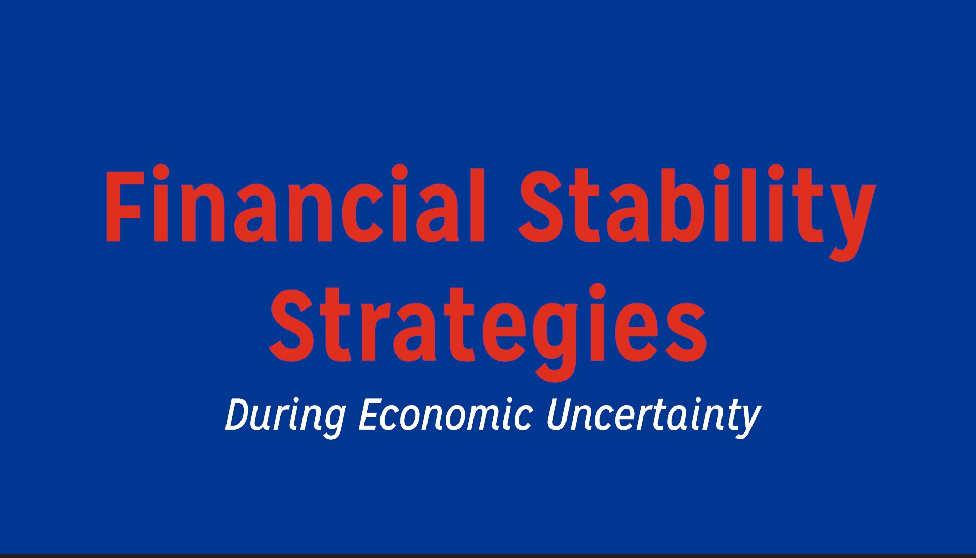To ensure you receive the best service possible,
please enter your zip code below:

Summary:
It’s natural to feel uneasy about your finances during economic uncertainty. Rising costs, market swings and shifting policies can all contribute to financial stress. Regardless of where you are in life, whether saving for a first home or planning for retirement, it’s normal to wonder how to manage money when things aren’t going to plan.
While you can’t control the economy, you can take steps to add more stability to your finances. Small changes can make a big difference, from adjusting your budget to revisiting your goals. Here are some strategies for how to budget money with confidence—even in uncertain times.

When the economy feels unpredictable, adjusting your budget is one of the most effective ways to regain a sense of control. A budget is like a roadmap. It helps you see where your money is going, identify areas to make changes, and curb emotional spending to help you avoid making big decisions without a plan.
One option to consider is building an emergency budget. It’s a simplified version of your regular budget that focuses on essential expenses like housing, groceries and utilities. It can identify areas to reduce or pause non-essentials like takeout or subscription services. Even if you don’t need it right now, having an emergency version ready can help you act quickly if your income suddenly changes or expenses rise.
Knowing where your money’s going can take some weight off your shoulders. It’s not just about cutting back but creating a situation where you feel more confident and prepared. If you’ve been thinking about how to manage money during uncertain times, starting with your budget is a solid first step.
Learn the ins and outs of personal finance and get valuable tips in AAA’s exclusive webcast “Saving for What Matters.”
Watch nowSetting money aside for emergencies can provide financial protection and help you feel more secure when the unexpected happens. Financial stress is incredibly common during times of economic uncertainty. Over 40% of adults say money worries contribute to anxiety or depression.
An emergency fund won’t solve everything, but it can ease some pressure if costs rise or life throws a curveball, like a job loss. Knowing you have a buffer to cover unexpected expenses, like a car repair, medical bill or monthly essentials, can help reduce future stress.
However, saving isn’t always easy—especially when everyday costs like groceries, gas, car repairs or rent feel higher than usual. Here’s how to start building your buffer:
Starting with small, consistent steps can make a difference for you over the long term. Regularly adding to your savings can help create more financial stability during times of uncertainty.

When things feel uncertain, it’s normal to question whether your financial goals still make sense. Maybe you’ve been saving for a big trip, putting money toward your kid’s education, or trying to increase retirement contributions. If those goals feel out of reach because the economy feels shaky, taking a step back is okay.
Many people can feel guilt or frustration at pressing pause on these goals. Research shows that shame and self-blame are typical emotional responses when people can’t meet financial obligations, especially during times of economic instability. It’s common to internalize these setbacks, even when larger external factors are the actual cause.
But adjusting your goals doesn’t mean you’ve failed. Building flexibility into your finances can actually help you stay on track over time. Set aside time to check on your financial goals. If your priorities don’t feel right, money is tight or timelines have shifted, consider making adjustments, like reducing contributions, shifting priorities to other needs or putting goals on hold temporarily to focus on immediate needs.
Sharing finances as a couple can be a source of harmony or contention in a relationship. Use these tips to set a foundation for a financially secure relationship.
Read MoreYour first instinct may be to cut back. But sometimes, it’s just about simplifying. Making some cuts can help clean up extra costs that quietly drain your bank account, without significantly impacting your lifestyle. Here’s where to look:
Decision fatigue is a real thing. And when you’re already stressed, small choices can start to feel like a lot. When your finances are easier to manage, you can focus on what really matters, reducing stress and making better decisions in the long run.

Debt can feel like a burden during economic uncertainty, and high-interest debt may add to financial stress. So, if you can, focusing on debt repayment may help you stay on track.
Consider prioritizing debt with the highest interest rates, such as credit card balances. If you’re struggling with multiple debts, strategies like the snowball method, which pays off the smallest balance first, or the avalanche method, which pays off the highest interest rates first, can help you make progress and stay motivated.
Also explore your options for refinancing loans. Calling lenders to negotiate new terms or lowering interest rates may help reduce your debt and immediately free up some funds. Some creditors may have hardship programs that can help you during difficult times, so it doesn’t hurt to ask.
Plan for your healthy financial future by following these do's and don'ts.
Read more
Cutting back may only go so far. Sometimes, the most effective way to add breathing room to your finances is bringing in extra income. Extra cash can help cover rising expenses or move you closer to your savings goals. Here are some options to explore:
Thinking about different ways to bring in a little extra money each month may help open more possibilities, adding flexibility to your finances.
You don’t need to overhaul your entire financial life to make progress. Trying to do too much at once can lead to burnout or keep you from starting at all, and when times are uncertain, that can lead to even more stress.
Financial stability isn’t about being perfect; steady progress can help you move forward. For example, even if you’re not in the financial position to boost retirement contributions now, schedule time to check in with your goals and make a plan for when you do have extra money. Or, if you can’t build a full emergency fund today, review your budget to see if you can set aside a small dollar amount towards it each week.
Giving yourself permission to start small can help you feel less overwhelmed and know you’re moving forward even when everything else feels up in the air.

When things like rising prices, market swings and questions about where the economy is headed come up, it’s natural to feel anxious about your finances.
No one can predict what happens next in times of uncertainty, but you can take steps to feel more prepared, and you don’t need a perfect plan to start feeling more in control. Small steps, like adjusting your budget, revisiting your goals and finding ways to boost your savings, can help you feel more steady, even if the economy isn’t.
Explore AAA Banking
From savings products and financial tools to insurance, AAA can help you feel more confident about your money—especially during uncertain times.
The information provided here is not investment, tax or financial advice. You should consult with a licensed professional for advice concerning your specific situation.
Legal & Compliance Reviewed: April 2025